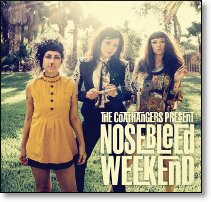
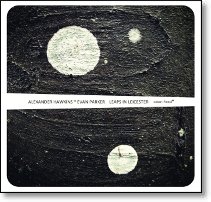
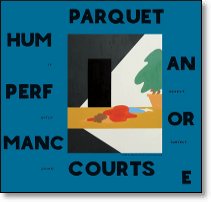
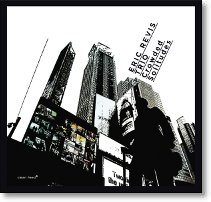
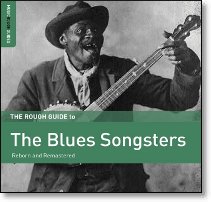
 |
 |
 |
 |
 |
Music: Current count 26515 [26475] rated (+40), 418 [425] unrated (-7).
Big bump in the rated count this week -- first time in well over a month to top 30 and did so by a bunch. Had a replenished jazz queue to work through, and until I got to the Clean Feeds they didn't require a lot of attention. Also noticed on Rhapsody a clutch of new records by artists I recognize as worth checking out (Hayes Carll, The Coathangers, Mayer Hawthorne, Parquet Courts, Sturgill Simpson, plus Kanye West finally appeared). Also had Jason Gubbels' list, and a couple Christgau Expert Witness columns (one on blues and another on alt-rock -- I had already written up Parquet Courts but not Coathangers or the new Tacocat, and my endorsement of Full Communism isn't just political).
Of the eight B+(***) records below, two were Christgau A- records (Tacocat, Kanye West). I gave up on them after two or three plays, without being certain more plays wouldn't help. Same thing for the Sturgill Simpson album, possibly an even better prospect. I'm having similar indecision with the new PJ Harvey, but save that for next week.
I voted in Downbeat's annual critics poll last week. I'm not going to do a separate post on this -- I was exhausted after it took more than 24 hours to I finish the 16 pages of ballots (with 50-some questions), on top of the usual aggravations and frustrations. Still, you can scan through my worksheet if you like. I suppose I should mention that I build each year's worksheet on the last, which helps with consistency (and jogs my increasingly damaged memory) but lets me get by without giving many questions much fresh thought. And this all the more true in categories I don't have any real thoughts -- fresh or received -- on, like Composer, Arranger, or various minor instruments (e.g., I almost never notice electric bass or keyboards, so trying to come up with three names there is even harder than trying to whittle down thirty or more luminaries on acoustic bass or piano).
I will mention that my HOF pick was George Russell. Downbeat's Hall is excessively restrictive and therefore woefully underpopulated, so there is a long list of worthies to pick from (and many more not even on Downbeat's prospect list). (By contrast, the Rock & Roll Hall of Fame is too large, not that the judges there have picked up all who deserve a slot.) Still, Russell is a giant among the uninducted, but he never has gotten the credit he deserves. For instance, when you think of Latin-Bebop, you recall Dizzy Gillespie (not the writer of "Cubana Be Cubana Bop"). When you think of modal jazz, you come up with Miles Davis and John Coltrane (not the guy who wrote the big book that showed how it is done). When you think of jazz workshops, you get Mingus (not Russell). Most likely you can't think of anyone who pioneered electronics in jazz. Or recall that Russell was the mentor of nearly a dozen important Scandinavian (mostly Norwegian) jazz musicians who started out in the early 1970s. When Russell returned from Norway, got a job at New England Conservatory where he was one of the architects of modern jazz education. The people who vote in Downbeat's Readers Poll are never going to put all that together, but you'd think that jazz critics would know at least this much.
Of course, many do, but they have other concerns, and the competition is stiff. It took Lee Konitz 65 years to get in last year, after finishing in the top three for nearly a decade -- leapfrogged many times recently by guys who finally got voters' attention the year before by dying (2006: Jackie McLean, 2007: Andrew Hill, 2009: Freddie Hubbard, 2011: Abbey Lincoln, 2012: Paul Motian, 2013: Charlie Haden, 2014: Jim Hall; Hank Jones won in 2008 then died in 2010; the only other living musician in this stretch was Muhal Richard Abrams in 2010; Russell died in 2009, got a boost then, but not enough). I have no idea who will win this year, but Paul Bley is probably the top choice among the recently deceased, and Anthony Braxton is the obvious pick among the living (and still very active).
I decided to write two names in, not so much because they were my next picks -- these rank lists are nowhere near that precise -- as hoping that they'll be picked up in future ballots: Mal Waldron and Jimmy Rushing. Waldron (1926-2002) is most famous as Billie Holiday's pianist, but he had a brilliant career as a leader and composer, made a remarkable move from postbop to avant-garde with his later group records like The Git Go and Crowd Scene, but perhaps his best records were duos with Steve Lacy, Marion Brown, and Jackie McLean (Left Alone '86). Rushing (1901-72) was the greatest of the Kansas City blues shouters, starting with Walter Page and Bennie Moten and following Count Basie to New York, where he cut many great albums -- a personal favorite from the year before he died is the out-of-print The You and Me That Used to Be.
This has nothing to do with music, but I should note and lament the passing of Dewane Hixon (1933-2016). He was a cousin, the oldest son of my mother's slightly older sister Edith. They moved from Oklahoma to Modesto, California in 1952, so we didn't see them much -- we drove to California in 1956; Edith, with two other sons (but I think not Dewane) came through Wichita around 1958. Dewane had a job working for an aircraft dealer and came to Wichita once for some training. He had a story about beating a traffic ticket when the cop stopped him and asked to see his pilot's license -- he whipped one out. I don't remember his father, Otis Hixon, who died from something heart-related in 1967, but relatives often said that Dewane reminded them of Otis, particularly as a practical joker. Dewane settled near Phoenix, and Edith moved there. After my mother died in 2000, we drove to Phoenix to see Edith, and spent quite a bit of time with Dewane. Edith died that December, at 89, the last of eight siblings. I went back to Phoenix two more times in the next few years. Always stopped to see Dewane, tell jokes, argue politics, and reminisce. He had a delivery service business, and was still working it last I heard last year. About half my cousins on my mother's side have passed now: all are older than me, the oldest survivor 90. Even stranger to lose that generation than my aunts and uncles before them.
Let me also note that I continue to be learn things from Thomas Frank's Listen, Liberal, which I quoted from in yesterday's post. The next few pages after yesterday's quote add to the list of Bill Clinton's "counter-scheduling" practices -- the crime bill, welfare reform, the "grand bargain" he was working on with Newt Gingrich to privatize a big chunk of Social Security. Frank focuses on how these acts reflect a deeper shift in the Democratic Party from a working-class base to one based on well-to-do professionals, one that may be socially liberal but cares little about inequality. Thus far -- I've gotten to be a shamefully slow reader, as well as one who can only focus for a few pages at a time, so I'm only about half-way through a short book -- he hasn't drawn out the political conclusions: e.g., how by undermining traditional Democratic groups Clinton was able to capture the party for his own personal purposes, which include fronting his wife's candidacy. But given what Frank shows, that part is pretty obvious.
In some ways I find Frank's book even more shocking than Jane Mayer's Dark Money. If it was just the Kochs and their ilk that had set out to undermine American democracy, there would be plenty of popular reaction. But when you turn the opposition over to "leaders" like the Clintons, there's no telling what they won't surrender (supposedly to defend you).
Recommended music links:
New records rated this week:
Recent reissues, compilations, and vault discoveries rated this week:
Old music rated this week:
Unpacking: Found in the mail last week: